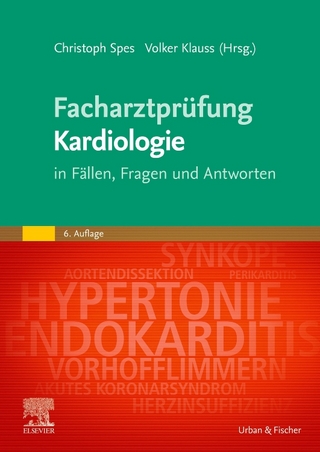
Biochemical Regulation of Myocardium
Springer (Verlag)
978-0-7923-4259-5 (ISBN)
This special issue of Molecular and Cellular Biochemistry contains original research papers as well as invited reviews dedi cated, on the occasion of the 40th anniversary of the inauguration of the Heart Research Group in Berlin-Buch that today forms a part there of the Max Delbriick Center for Molecular Medicine, to Professor Albert Wollenberger, founder of the Heart Research Group and for 21 years its head. The papers in this issue are written by researchers working in the field of cardiovascular research who together with Albert Wollenberger share the belief that an integrative application of advances in molecular and cellular biology will lead to new concepts for treatment and prevention of cardiovascular diseases. We hope that this special will serve as a good source of information in this regard. We wish to thank all of the contributors for their help and cooperation. We also wish to thank Mrs. Verona Kuhle for her secretarial help. We are grateful to Dr. Naranjan S. Dhalla, Editor-in-Chief of Molecular and Cellular Biochemistry for his interest and encouragement, and for agreeing to publish this issue in honor of Albert Wollenberger. ROLAND VETTER and ERNST -GEORG KRAUSE Max Delbriick Center for Molecular Medicine, Robert-Rossle-StraBe 10, 13122 Berlin-Buch, Germany PART I CARDIAC DEVELOPMENT AND REGULATION Molecular and Cellular Biochemistry 163/164: 5-11, 1996. © 1996 Kluwer Academic Publishers.
I: Cardiac development and regulation.- Excitation-contraction coupling of the developing rat heart.- Developmental changes of calcium transients and contractility during the cultivation of rat neonatal cardiomyocytes.- Calcium channels and cation transport ATPases in cardiac hypertrophy induced by aortic constriction in newborn rats.- G proteins, adenylyl cyclase and related phosphoproteins in the developing rat heart.- Localization of ? 1,2,3-subunit isoforms of Na, K-ATPase in cultured neonatal and adult rat myocardium: The immunofluorescence and immunocytochemical study.- Immediate postnatal rat heart development modified by abdominal aortic banding: Analysis of gene expression.- Early postnatal changes in sarcoplasmic reticulum calcium transport function in spontaneously hypertensive rats.- Cardiac phosphocreatine deficiency induced by GPA during postnatal development in rat.- Role of bradykinin in the antihypertrophic effects of enalapril in the newborn pig heart.- Regulation of the slow Ca++ channels of myocardial cells.- In vivo phosphorylation of the cardiac L-type calcium channel beta-subunit in response to catecholamines.- Antibodies from Trypanosoma cruzi infected mice recognize the second extracellular loop of the ?1-adrenergic and M2-muscarinic receptors and regulate calcium channels in isolated cardiomyocytes.- ?2-Adrenoceptor activation by zinterol causes protein phosphorylation, contractile effects and relaxant effects through a cAMP pathway in human atrium113–123.- Early after-depolarisations induced by noradrenaline may be initiated by calcium released from sarcoplasmic reticulum.- Cardiac pump function of the isolated rat heart at two modes of energy deprivation and effect of adrenergic stimulation.- Regulation of ?-adrenoceptor properties andthe lipid milieu in heart muscle membranes during stress.- Heart glycogen content and isoprenaline-induced myocardial lesions.- Role of vascular adrenergic mechanisms in the haemodynamic and PGI2 stimulating effects of angiotensin in diabetic dogs.- Localization of ?1-adrenoceptors in rat and human hearts by immunocytochemistry.- Inositol-1,4,5-trisphosphate mass content in isolated perfused rat heart during alpha-1 -adrenoceptor stimulation.- Interstitial noradrenaline concentration of rat hearts as influenced by cellular catecholamine uptake mechanisms.- Characterization of catecholamine uptake2 in isolated cardiac myocytes.- Effects of anti-peptide antibodies against the second extracellular loop of human M2 muscarinic acetylcholine receptors on transmembrane potentials and currents in guinea pig ventricular myocytes.- II: Cardiac hypertrophy and failure.- Molecular aspects of mechanical stress-induced cardiac hypertrophy.- Catecholamines and cardiac growth.- Hypertrophic responsiveness to ?2-adrenoceptor stimulation on adult ventricular cardiomyocytes.- Reduction of cardiac hypertrophy in TGR (mREN2)27 by angiotensin II receptor blockade.- The effect of insulin-like growth factor-1 on adult rat cardiac contractility.- Effect of angiotensin II on myocardial collagen gene expression.- Chronic low-dose treatment with enalapril induced cardiac regression of left ventricular hypertrophy.- Heterotopic heart transplantation alters high-energy phosphate metabolism irrespective of cardiac allograft rejection.- Myocardial fibrosis and right ventricular function of heterotopically transplanted hearts in rats treated with cyclosporine.- Apoptosis in the heart: When and why?.- Human myocardial Na, K-ATPase concentration in heart failure.- Decreased expression of cardiacsarcoplasmic reticulum Ca2+-pump ATPase in congestive heart failure due to myocardial infarction.- Elucidating molecular mechanisms of septic cardiomyopathy — the cardiomyocyte model.- Alterations in inotropy, nitric oxide and cyclic GMP synthesis, protein phosphorylation and ADP-ribosylation in the endotoxin-treated rat myocardium and cardiomyocytes.- Significance of the adenine nucleotide of translocator in the pathogenesis of viral heart disease.- Differences in response to activation of adenylyl cyclase by various stimulants in human myocardium.- Circulating antibodies against neonatal cardiac muscarinic acetylcholine receptor in patients with Sjögren’s syndrome.- Characterization of anti-heart M2 muscarinic receptor antibodies — a combined clinical and experimental study.- Index to Volumes 163 and 164.
| Erscheint lt. Verlag | 31.12.1996 |
|---|---|
| Reihe/Serie | Developments in Molecular and Cellular Biochemistry ; 19 |
| Zusatzinfo | VI, 353 p. |
| Verlagsort | Dordrecht |
| Sprache | englisch |
| Maße | 210 x 280 mm |
| Themenwelt | Medizinische Fachgebiete ► Innere Medizin ► Kardiologie / Angiologie |
| Naturwissenschaften ► Biologie ► Biochemie | |
| ISBN-10 | 0-7923-4259-3 / 0792342593 |
| ISBN-13 | 978-0-7923-4259-5 / 9780792342595 |
| Zustand | Neuware |
| Informationen gemäß Produktsicherheitsverordnung (GPSR) | |
| Haben Sie eine Frage zum Produkt? |
aus dem Bereich


